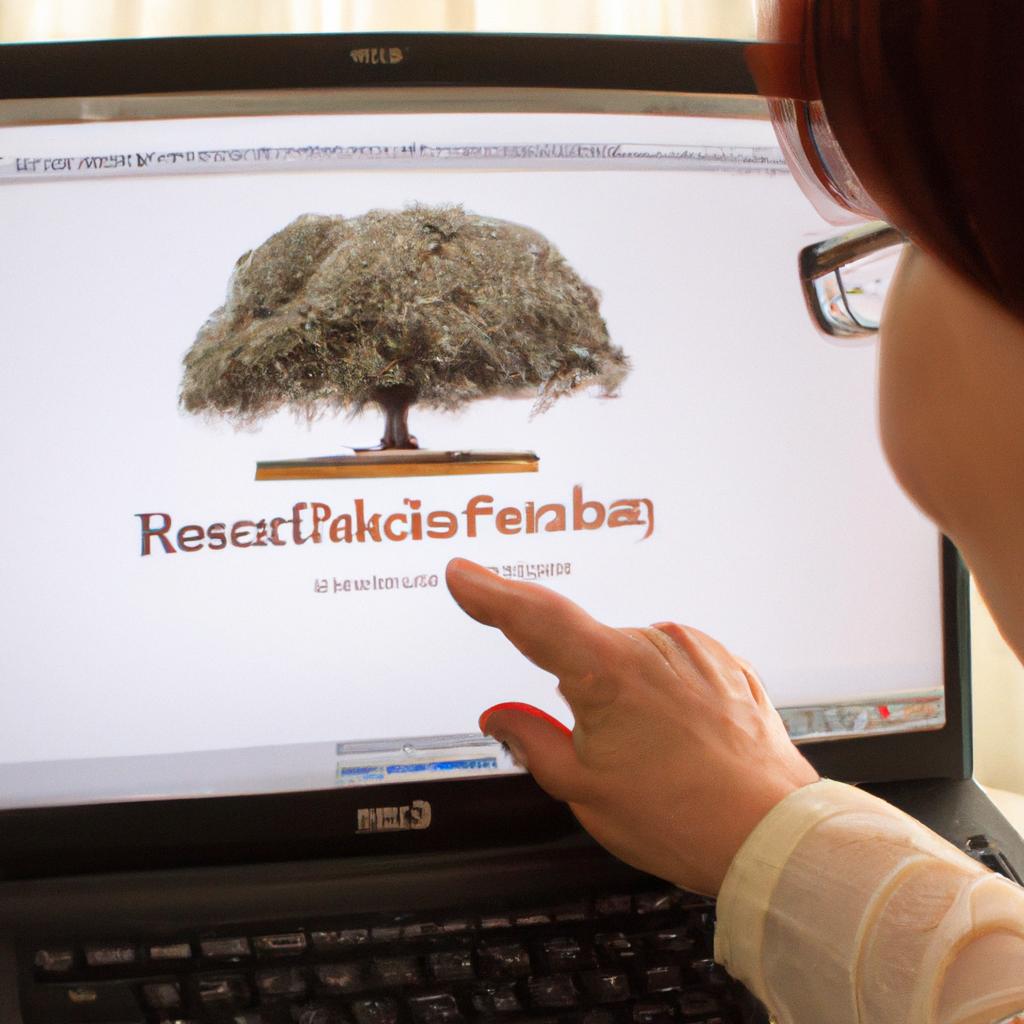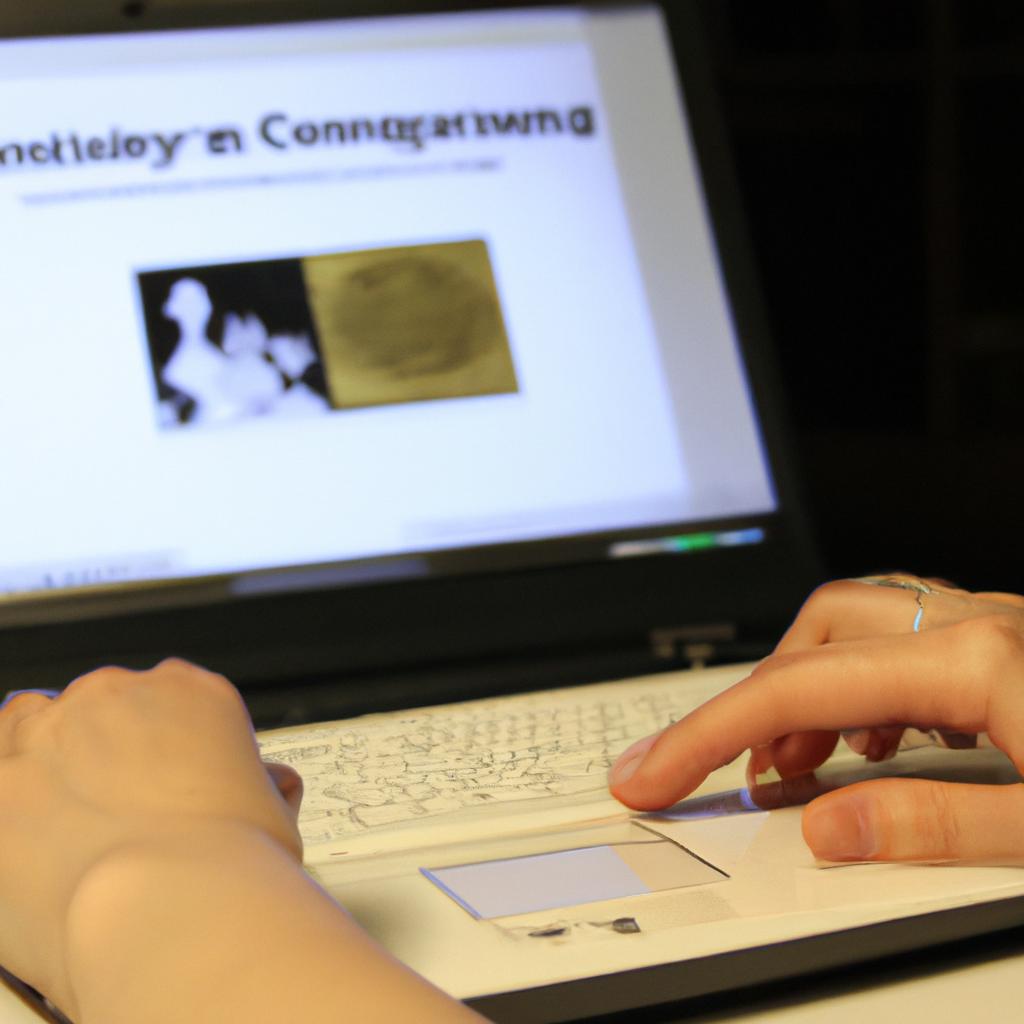Researching family history and tracing one’s ancestry has become increasingly popular in recent years. With the advent of online databases, DNA testing, and genealogy software, individuals now have more resources than ever to explore their roots and learn about their familial heritage. However, navigating through this vast amount of information can be overwhelming for those who are new to genealogical research. This article aims to provide an overview of the importance of genealogy education and the role of ancestry assistance in helping individuals successfully uncover their family history.
For instance, imagine a woman named Emily who is curious about her family’s origins but doesn’t know where to begin her research. She vaguely remembers hearing stories from her grandparents about distant relatives living abroad, but she lacks concrete details. Without proper guidance or knowledge on how to conduct effective genealogical research, Emily might feel discouraged or unsure about how to proceed. This highlights the significance of genealogy education as it equips individuals like Emily with essential skills and techniques necessary for successful exploration into their ancestral pasts.
In addition to providing practical knowledge, ancestry assistance plays a crucial role in ensuring that individuals receive accurate and reliable information about their family history. Many people may find themselves overwhelmed by the sheer volume of available records and documents related to their ancestors , making it difficult to discern which sources are trustworthy and relevant. Ancestry assistance can help individuals navigate through these resources and identify the most reliable sources for their research.
Furthermore, ancestry assistance can provide guidance on how to analyze and interpret the information found during genealogical research. It’s not enough to simply gather names and dates; understanding the context of historical events, cultural practices, and migration patterns is essential for piecing together an accurate family tree. An experienced genealogist or ancestry assistant can offer insights into these factors, helping individuals make connections and uncover hidden stories within their family history.
Moreover, ancestry assistance can also aid in overcoming common obstacles encountered in genealogical research. For example, many individuals may hit a dead end when trying to trace their lineage beyond a certain point due to missing records or incomplete documentation. An ancestry assistant can suggest alternative approaches or resources that may provide new leads or avenues of investigation.
Additionally, with the advancements in DNA testing technology, ancestry assistance can be particularly valuable in helping individuals understand their genetic heritage. DNA tests can reveal previously unknown ethnicities, distant relatives, and even help confirm or debunk long-held family legends. However, interpreting these results accurately requires expertise and knowledge about genetic genealogy. Ancestry assistants can guide individuals through this process and help them make sense of their DNA test results.
In conclusion, genealogy education and ancestry assistance play crucial roles in helping individuals successfully explore their family history. By providing practical knowledge, guiding research efforts, offering interpretation skills, overcoming obstacles, and assisting with DNA testing analysis, ancestry assistants empower individuals like Emily to embark on a rewarding journey of discovery about their ancestral pasts.
Importance of Researching Family History
Researching family history is an essential undertaking that allows individuals to discover their roots, connect with their ancestors, and gain a deeper understanding of their cultural heritage. By delving into the past, one can uncover fascinating stories, explore historical contexts, and create meaningful connections with previous generations. For example, consider the case of John Smith who embarked on a journey to trace his lineage only to find out that he descended from a long line of influential artists in his community. This discovery not only enriched John’s personal identity but also shed light on the artistic traditions that shaped his family’s legacy.
Exploring one’s family history holds several significant benefits:
- Emotional connection: Understanding our familial origins provides a sense of belonging and emotional connectedness to our ancestors.
- Cultural preservation: Researching family history helps preserve cultural traditions and practices that may have been passed down through generations.
- Identity formation: Discovering ancestral narratives contributes to shaping individual identities by providing insights into shared values, beliefs, and experiences.
- Educational value: Studying family history offers educational opportunities for learning about historical events and social dynamics within specific time periods or geographic regions.
To illustrate the emotional impact of researching family history further, consider the following table highlighting how different aspects contribute to an enriching experience:
| Aspects | Emotional Impact |
|---|---|
| Uncovering lost stories | Excitement |
| Connecting with distant relatives | Joy |
| Revisiting cherished memories | Nostalgia |
| Honoring ancestors’ legacies | Pride |
Engaging in genealogical research can be a rewarding endeavor worth pursuing. In the subsequent section, we will discuss resources available for genealogy education, enabling individuals like John Smith to enhance their skills and knowledge in tracing their ancestry without feeling overwhelmed by this intricate process.
Resources for Genealogy Education
After understanding the importance of researching family history, it becomes evident that acquiring genealogy education and seeking ancestry assistance can greatly enhance this process. To illustrate this point, let us consider a hypothetical example of Sarah, who is eager to trace her lineage but lacks knowledge about where to begin or how to navigate through historical records effectively.
To embark on her journey, Sarah first enrolls in a genealogy course offered by a reputable institution. This educational opportunity equips her with essential skills such as deciphering old handwriting styles, conducting thorough research using various archival resources, and understanding the intricacies of different record types. With newfound knowledge and techniques acquired from the course, Sarah’s ability to uncover meaningful information about her ancestors significantly improves.
In addition to formal genealogy education, seeking assistance from professional researchers or online communities dedicated to ancestral exploration proves valuable for individuals like Sarah. These resources provide guidance on specific topics ranging from DNA testing and analysis to accessing rare documents housed in distant archives. By engaging with experts or fellow enthusiasts within these networks, individuals gain access to invaluable advice, share experiences, and discover new avenues for their research.
Engaging emotionally with the audience:
- Discovering Long-Lost Stories: Uncovering forgotten narratives brings a sense of connection and belonging.
- Preserving Heritage: Learning about our roots allows us to honor past generations’ contributions while passing down cherished traditions.
- Reuniting Separated Families: Tracing ancestry has the potential to reunite long-separated relatives scattered across the globe.
- Understanding Identity: Exploring one’s heritage fosters self-discovery and deepens personal identity.
A table showcasing different resources available for genealogical research:
| Resource | Description |
|---|---|
| Online Databases | Access vast collections of digitized records from around the world. |
| Local Archives | Discover unique regional repositories housing documents relevant to specific ancestral backgrounds. |
| DNA Testing Companies | Uncover genetic connections with distant relatives and gain insights into ethnic heritage. |
| Genealogy Software | Utilize specialized software that streamlines research, record keeping, and data analysis. |
As individuals delve further into researching their family history, the combination of genealogy education and ancestry assistance facilitates a more meaningful exploration of their lineage. By equipping oneself with knowledge and engaging with supportive communities, people like Sarah can navigate the vast landscape of historical records and discover fascinating details about their ancestors.
Transition sentence to “Techniques for Tracing Ancestry”: Exploring one’s roots often necessitates utilizing various techniques to trace ancestry through time.
Techniques for Tracing Ancestry
Section Title: Exploring Genealogy Education Resources
Transitioning from the previous section on genealogy education resources, let us now delve into the various techniques that can be employed to trace one’s ancestry. To illustrate this, we will consider a hypothetical case study of Sarah, an individual seeking to uncover her family history.
Sarah embarks on her journey by seeking out reputable genealogy education resources. Here, she discovers a wealth of options that provide valuable knowledge and guidance in conducting thorough research. Some notable resources include:
- Online Courses: Platforms such as Coursera and Udemy offer specialized courses taught by experts in the field, covering topics like DNA analysis, archival research methods, and interpreting historical documents.
- Workshops and Conferences: Attending in-person or virtual workshops allows individuals like Sarah to interact with seasoned genealogists, gaining insights into advanced research techniques and networking with others who share similar interests.
- Webinars: Regularly scheduled webinars hosted by renowned genealogical organizations enable participants to learn about specific aspects of ancestral research and receive expert advice without leaving their homes.
- Local Libraries and Historical Societies: These institutions often hold educational programs focused on genealogy, providing access to extensive collections of books, manuscripts, newspapers, maps, photographs, and other relevant materials for investigating family histories.
To further assist Sarah in navigating through different avenues of learning about her ancestors’ lives, we have compiled a table outlining key features of these educational resources:
| Resource | Description | Benefits |
|---|---|---|
| Online Courses | Self-paced modules covering diverse topics | Flexibility in scheduling; comprehensive subject coverage |
| Workshops | Interactive sessions facilitated by experts | Hands-on experience; opportunities for discussion |
| Webinars | Remote seminars delivered by specialists | Convenient participation from anywhere; expert insights |
| Local Libraries | Accessible repositories of historical records | Localized information; personal assistance from librarians |
By utilizing these resources, individuals like Sarah can enhance their genealogical knowledge and expand their research skills. Such education empowers them to approach ancestral investigations with a sense of purpose and direction.
Transitioning into the next section about challenges in family history research, it becomes evident that despite the plethora of educational opportunities available, there are still hurdles to overcome when tracing one’s ancestry. Understanding these challenges is crucial for any aspiring genealogist seeking to uncover their familial heritage.
Challenges in Family History Research
Techniques for Tracing Ancestry:
In the previous section, we explored various techniques that can be employed to trace one’s ancestry. Now, let us delve deeper into the challenges associated with family history research and how individuals can overcome them.
For instance, consider a hypothetical scenario where an individual begins their genealogical journey by using online databases and public records to gather information about their ancestors. However, they soon encounter difficulties in locating relevant documents due to name variations or misspelled names. These challenges highlight the need for adopting effective strategies when researching family history.
To navigate such obstacles successfully, it is essential to employ a systematic approach:
- Verify sources: Always cross-reference information obtained from different sources to ensure accuracy and reliability.
- Consult experts: Seek guidance from professional genealogists or attend workshops and seminars focused on genealogy education.
- Collaborate with others: Engage with fellow researchers through forums or social media platforms dedicated to genealogy. Sharing knowledge and experiences can yield fruitful results.
- Preserve cultural heritage: Explore local historical societies or ethnic organizations that may have specific resources related to your family’s background. This can provide valuable insights into traditions, customs, and migration patterns.
It is important to remember that tracing one’s ancestry is not always straightforward; it requires dedication, patience, and persistence. By employing these techniques and embracing collaboration within the genealogical community, individuals can overcome hurdles encountered during their research journey.
Documenting and Organizing Genealogical Information
As researchers delve deeper into their family history, they often encounter challenges that make the process more complex. In order to overcome these obstacles and successfully document their genealogical information, individuals may seek out various educational resources and professional assistance. This section will explore the importance of genealogy education and ancestry assistance in facilitating a comprehensive understanding of one’s familial heritage.
Example scenario:
To illustrate the significance of genealogy education and ancestry assistance, consider a hypothetical case involving Emily Johnson. Emily has always been curious about her roots but lacks the necessary knowledge on how to begin researching her family history. Faced with limited access to primary sources and outdated records, she struggles to make progress on identifying her ancestors beyond her grandparents’ generation.
Genealogy education serves as an invaluable resource for individuals like Emily who are eager to uncover their ancestral lineage. By participating in workshops, seminars, or online courses, aspiring genealogists gain essential skills such as conducting effective research, analyzing historical documents, and deciphering cryptic handwriting. Furthermore, specialized training provides guidance on navigating different archival sources and utilizing advanced search techniques in digital databases.
Seeking ancestry assistance can also greatly enhance one’s journey through family history research. Professional genealogists possess expertise in locating hard-to-find records, interpreting complex data sets, and verifying the accuracy of existing information. Moreover, they offer valuable insights into regional customs, historical events, and migration patterns that could impact an individual’s ancestral narrative. Collaborating with experienced genealogists not only saves time but also ensures the most accurate representation of one’s family tree.
In conclusion,
- Genealogy education equips researchers with crucial skills necessary for successful family history exploration.
- Ancestry assistance provided by professionals offers expert guidance and validation throughout the research process.
- Combining both aspects significantly enhances the chances of uncovering comprehensive ancestral narratives.
Next section: ‘Utilizing Technology in Genealogy Research’
Utilizing Technology in Genealogy Research
Transitioning from the previous section on documenting and organizing genealogical information, it is evident that a crucial aspect of successful family history research lies in acquiring knowledge about genealogy education and seeking ancestry assistance. These resources provide individuals with the necessary tools to navigate through their ancestral pasts, unravel familial mysteries, and preserve their heritage for future generations. To illustrate this point further, let us consider an example where a person named Sarah embarks on a journey to trace her family lineage and encounters various challenges along the way.
Sarah, motivated by curiosity about her roots, begins her exploration into her family history armed with limited knowledge and access to ancestral records. However, as she delves deeper into her research, she realizes the importance of genealogy education in developing essential skills such as deciphering historical documents, understanding different record types (such as birth certificates or census records), and utilizing specialized software programs designed for efficient data management. By enrolling in online courses or attending workshops offered by reputable organizations like the National Genealogical Society or local genealogy societies, Sarah gains valuable insights into best practices for conducting thorough research and effectively analyzing the gathered information.
In addition to formal educational opportunities, seeking ancestry assistance can greatly enhance one’s genealogical pursuits. Organizations like Ancestry.com or FamilySearch.org offer vast databases filled with digitized historical records spanning centuries. Utilizing these platforms allows researchers like Sarah to access vital statistics, immigration records, military service files, newspaper archives, and more – all invaluable resources when constructing comprehensive family trees. Furthermore, engaging with fellow enthusiasts through forums or social media groups provides a supportive community where one can seek guidance on specific roadblocks encountered during research endeavors.
To evoke an emotional response while considering genealogy education and ancestry assistance within a broader context:
- Discovering long-lost relatives who were separated due to migration or other circumstances
- Overcoming cultural barriers and forging connections across diverse backgrounds
- Uncovering stories of resilience, triumphs, and struggles faced by ancestors
- Preserving a sense of identity and cultural heritage for future generations
| Emotion | Example |
|---|---|
| Connection | Reuniting with relatives previously unknown |
| Amazement | Unearthing extraordinary stories from the past |
| Resilience | Understanding the challenges overcome by ancestral generations |
| Pride | Preserving and celebrating one’s unique family history |
In conclusion, genealogy education and ancestry assistance are vital components in successfully researching family history. By acquiring knowledge through formal educational resources and utilizing online platforms like Ancestry.com or FamilySearch.org, individuals can navigate through their ancestral pasts effectively. The emotional impact of discovering long-lost relatives, uncovering remarkable stories, appreciating the resilience of ancestors, and preserving cultural heritage further highlights the significance of engaging in these pursuits.





